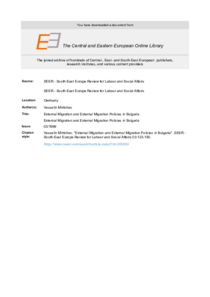External migration and external migration policies in Bulgaria

South-East Europe Review for labour and social affairs : SEER
1999
2
3
123-150
Migration
English
Bibliogr.;Statistics
"External migration is a new problem for the post-communist countries. One of the consequences of the collapse of the totalitarian regimes in the eastern part of Europe is the increase in the mobility of the population and especially, mostly for political reasons, of minorities in the region. Faced with the growing desire of people to travel, and to look for better living conditions, east European administrations are trying to put these processes under control. Bulgaria is no exception. The Ministry of Labour and Social Care, i.e. the Employment Office, administrates bilateral agreements for labour emigration, licenses intermediary firms for informing and employing those willing to seek moves abroad (Convention No. 181, ILO, 1997) and intermediates in the signing of individual labour contracts between Bulgarian citizens and foreign employers. Against the background of the current problems, this article presents a review of the great migratory movements of Bulgarians in the past and summarises the existing data on the emigration, immigration, and transit flows passing through Bulgaria. The article also provides a detailed examination of the regulation of labour emigration from Bulgaria, as well as of the issues connected with access to the local labour market and the updating of Bulgarian immigration policy. The development of small and medium enterprises is analysed in the context of a possible alternative to emigration pressure."
Digital;Paper
The ETUI is co-funded by the European Union. Views and opinions expressed are however those of the author(s) only and do not necessarily reflect those of the European Union or the ETUI.